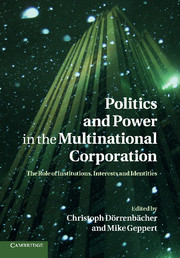 Politics and Power in the Multinational Corporation
Politics and Power in the Multinational Corporation Published online by Cambridge University Press: 26 April 2011
The MNC as a political organization
I will argue that the business firm is properly viewed as a political system and that viewing the firm as such a system both clarifies conventional economic theories of the firm and … suggests some ways of dealing with classical problems in the theory of political systems generally.
(March 1962: 663)Organizations, particularly large ones, are like governments in that they are fundamentally political entities. To understand them, one needs to understand organizational politics …
(Pfeffer 1992: 29)The above quotes exemplify the reality of the functioning of all large and complex organizations. Large business firms in general and multinational corporations or companies (MNCs) in particular form a large and important set within this group. Yet most theories aimed at explaining the functioning of business firms, both in strategic management and economics either ignore the political dimension of the organization, or treat it as an aberration. In the mainstream literature, the strategy of business firms has traditionally been accepted to be the creation and maintenance of competitive advantage.
As noted by Mintzberg (1979), the operation of a business firm gives rise to both cooperation and conflict. Conflicts can arise between owners and managers in the division of the value created by the firm as well as amongst managers in the struggle for power and control rights within the firm. It is this latter set of conflicts that is the subject of this very topical volume.
To save this book to your Kindle, first ensure [email protected] is added to your Approved Personal Document E-mail List under your Personal Document Settings on the Manage Your Content and Devices page of your Amazon account. Then enter the ‘name’ part of your Kindle email address below. Find out more about saving to your Kindle.
Note you can select to save to either the @free.kindle.com or @kindle.com variations. ‘@free.kindle.com’ emails are free but can only be saved to your device when it is connected to wi-fi. ‘@kindle.com’ emails can be delivered even when you are not connected to wi-fi, but note that service fees apply.
Find out more about the Kindle Personal Document Service.
To save content items to your account, please confirm that you agree to abide by our usage policies. If this is the first time you use this feature, you will be asked to authorise Cambridge Core to connect with your account. Find out more about saving content to Dropbox.
To save content items to your account, please confirm that you agree to abide by our usage policies. If this is the first time you use this feature, you will be asked to authorise Cambridge Core to connect with your account. Find out more about saving content to Google Drive.